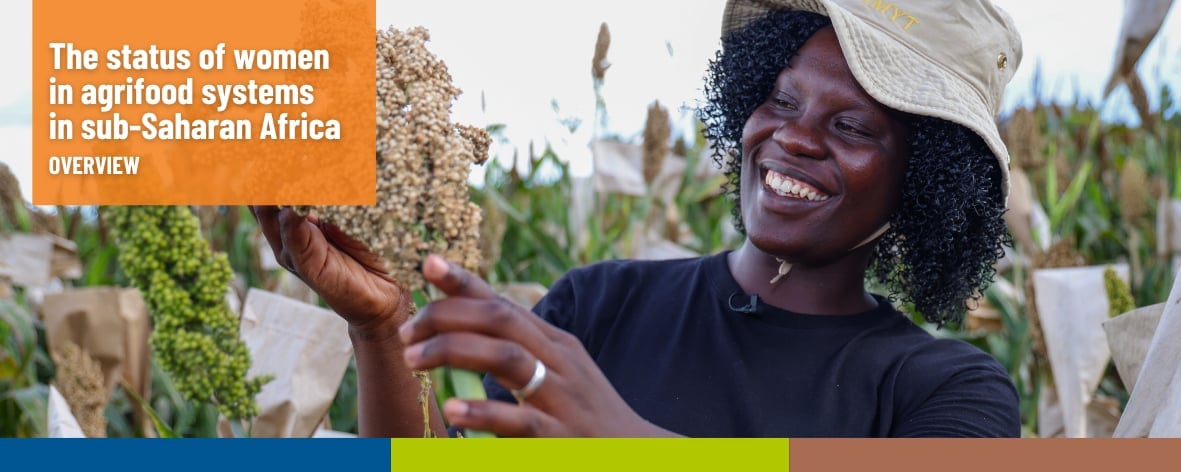November 13, 2025 | 10:07 GMT +7
November 13, 2025 | 10:07 GMT +7
Hotline: 0913.378.918
November 13, 2025 | 10:07 GMT +7
Hotline: 0913.378.918
Within agrifood systems, women’s employment in off-farm segments – such as production, processing, distribution, consumption and packaging – is increasing across the region, rising to 29 percent in 2022 from 21 percent in 2005.

The report highlights that in sub-Saharan Africa, women are recognized as carriers of culture, knowledge and social cohesion within agrifood systems. Photo: FAO.
These figures were presented in the overview of The Status of Women in Agrifood Systems in Sub-Saharan Africareport released today by the Food and Agriculture Organization of the United Nations (FAO), the Natural Resources Institute of the University of Greenwich (NRI) and African Women in Agricultural Research and Development (AWARD) during the Africa Food Systems Forum in Dakar, Senegal.
The report highlights that in sub-Saharan Africa, women are recognized as carriers of culture, knowledge and social cohesion within agrifood systems. It suggests that greater investment in women’s empowerment can boost social justice and unlock inclusive growth, food security and climate resilience. Securing African women’s rights to natural resources and ecological repair are also essential for achieving gender equality, enhancing their agency and economic opportunities, and increasing their resilience to climate, environmental, health and economic shocks.
While women make up almost three-quarters (73 percent) of the workforce in food processing and services, the figure drops to only 3 percent in transport, highlighting the tendency for women to be concentrated in roles closely aligned with domestic and reproductive work. Meanwhile, more than 90 percent of employed women in the region work in the informal sector. Their work remains largely under-recognized and undervalued, which limits women’s visibility and influence.
“Agrifood systems across sub-Saharan Africa are powered by women’s informal, domestic and subsistence work. Investments and enabling policies are needed to create more formal wage-paying jobs for women, and social protection programmes must be expanded to safeguard women’s livelihoods,” said Abebe Haile-Gabriel, FAO Assistant Director-General and Regional Representative for Africa.
In 28 of the 33 sub-Saharan African countries for which data on agricultural land ownership are available, men are more likely than women to own land or hold secure land rights. Systemic barriers limit women’s access to not just land, but also water and forests, which are necessary for their own and their family’s well-being and livelihoods.
“Positive change already exists in sub-Saharan Africa which is directly addressing the inequalities faced by diverse women in the region– such as collective action towards women’s land rights, addressing gender based violence, and leadership in agroecological movements and natural resource governance– while there is a long way to go, these changes can improve women’s livelihoods and wellbeing, as well as ensure women’s priorities are more meaningfully represented in decision-making,” highlighted Dr Lora Forsythe, Associate Professor in Gender, Inequalities and Food Systems at NRI.
The region has seen a sharp rise in the prevalence of food insecurity over the last decade. According to the most recent data, around 64 percent of the population experienced moderate or severe food insecurity in 2024, with 11.2 million more women than men being affected. Almost 40 percent of women aged 15–49 in sub-Saharan Africa are anaemic. Moreover, many women in the region face serious occupational health risks in agrifood systems, and gender-based violence is pervasive.
Presenting the report in Dakar on behalf of FAO, NRI and AWARD, AWARD Director Dr Susan Kaaria emphasized that gender-transformative approaches can be effective in tackling the root causes of inequality and boosting women’s agency. “Achieving gender equality and empowering women in agrifood systems is both a moral imperative and an effective policy choice. It is key to social justice as well as unlocking inclusive growth, food security and climate resilience,” said Dr Kaaria.
(FAO)

(VAN) The shared goal of Viet Nam and EU is to create a barrier-free cooperative environment that ensures balanced benefits and a common direction toward sustainable development.

(VAN) FAO Representative in Viet Nam stated that the country not only ensures domestic food security but also helps shape a sustainable global food system.

(VAN) Vietnam’s environmental sector affirms its pioneering role in protecting natural resources, maintaining ecological balance, and advancing sustainable, green, and harmonious national development.

(VAN) From straw, coffee husks, to sugarcane bagasse, agricultural by-products are being transformed into new resources for a lower-emission future in crop production.

(VAN) The application of remote sensing technology and AI is becoming a strategic tool helping Viet Nam modernize agriculture management and implement smart environmental governance.

(VAN) From the early days, international cooperation has helped Vietnam’s agriculture sector broaden its vision, access knowledge, and achieve significant progress in development and poverty reduction.

(VAN) Over the past 80 years of formation and development, Quang Ninh has affirmed its pioneering position in resource management and environmental protection.